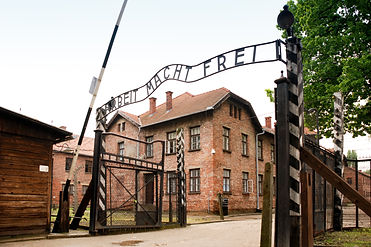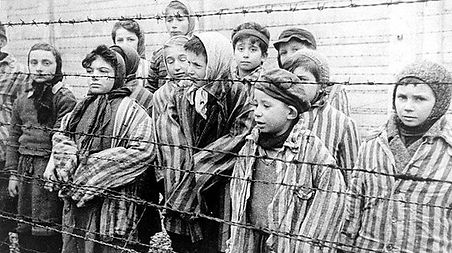
Discover New York: Waterworld
Daniel Polishchuk
My e-Portfolio
The State of Things
As Jews, my family and I were always aware of being different. Before they immigrated to America, my mother and her family experienced a lot of discrimination for being Jewish, also known as Anti-Semitism. My mother and my grandparents were born in Belarus, then part of the Soviet Union, an area with many incidents of Anti-Semitism. My mother grew up hearing stories that Jews who went to certain, prestigious universities, were told by the admissions department that they could not be accepted because of their religion, no matter how good their grades were. It was as if an “unofficial quota” existed. This was not legal, but the government did not offer any protection for the Jews. When my mother was a child, there were other kids in her building, who called her derogatory names because she was Jewish. It got to the point that she felt physically threatened by them, and felt afraid to go outside when those groups of boys were there. At school, where there were quite a few Jewish students, my mother witnessed a Jewish boy being targeted when derogatory names were written on the walls of the school. The principal of the school gathered all the students and made a speech on the need to respect other people. This changed nothing, and the boy continued to be abused. At that age, when my mother saw these things being done to another Jew, her natural inclination was to hide her identity, which is a horrible feeling. Therefore, a few years later, they moved to America in search of freedom. I don’t look like a stereotypical Jew, but I still feel that I am different. I have seen incidents that have taken place to other Jews around New York, and even that has an impact on me, it hurts. Fortunately, there have never been pogroms in America, there have never been any respectable antisemitic political parties in America, and there have never been any federal laws curtailing Jewish opportunities in America (Dinnerstein 245). Although there is an entirely different sense of freedom here than other countries, there is still some fear inside of me of how some, specific strangers might perceive me if they knew I was a Jew. Nevertheless, I feel much safer being in America.
Anti-Semitism has been prevalent throughout history, all over the world. It resulted when Jews began to settle outside
the land of what was then, Palestine. The Jews’ refusal to adopt the religions of people who lived in those lands and their social segregation created resentment among the leaders of those lands (Berenbaum). One of the first examples we see of this is in the Bible, when Pharaoh, king of Egypt, enslaves all the Jews. Centuries later, with the rise of Christianity, the two destructions of the Jewish temple, and as it became the established religion of the Roman Empire, problems ensued. Jews refused to accept beliefs of Christianity and they were immediately viewed as a threat to the Roman Empire and Christianity. Jews began to be ostracized as they could not work in government, they were forbidden to marry Christians, and many other restrictions were placed on them. Jews became the scapegoat for events such as the Bubonic Plague, being violently punished as a result. Over time, they lost more legal and civil rights, being subjected to political, economic, and social discrimination. They were forced to live in ghettos and they had to wear a symbol to distinguish them from everyone else (ADL). In the 20th century, the worst and the most unthinkable event occurred, the Holocaust. As a result of Adolf Hitler and the Nazi party coming to power, the Jews were systematically persecuted and murdered in concentration camps across Europe. Jewish communities that existed for centuries were completely eradicated. At the end of World War II, six million Jews were murdered. Three years later, the State of Israel was established, a homeland for the Jews. This exacerbated the Arab-Israeli conflict over who is the rightful owner of the land of Israel, which has continued until today. When antisemitism entered the political culture of European states in the last decades in the 19th century, people intended for it to remain until the battle against Jewry would be won, a struggle they expected would last years, possibly centuries (Lindemann 251). Anti-semitism still exists today, and there has even been a small resurgence recently. There are many historical precedents for discrimination against the Jews, but the event of the Holocaust made the world open its eyes and it became far less accepted up to a point where hopefully an event of such magnitude does not happen again.
The solution to correcting these issues are very complex. However, it begins with realizing the issue, becoming educated
about it and it’s severity. For example, learning about the Holocaust will hopefully ensure that an event such as that will never happen again. Learning about the history of African-Americans and how they were segregated in their communities and sometimes denied the rights of a basic American citizen can help prevent those conditions from occurring again. Once we become educated, then we can accurately transmit that information to the next generation and think of possible solutions. The next generation is made of people who will have the power to make those important decisions in the future. Whether it is someone working in real estate who has the opportunity to provide a better opportunity for African Americans to own homes or creating policies that will prevent groups from being discriminated against and becoming isolated, acknowledging the past is the only way to move forward. Once we acknowledge it, we learn from it and prevent those mistakes from happening again in the future. As James Baldwin says, "It's a problem of whether or not you're willing to look at your life and be responsible for it, and then begin to change it" (I Am Not Your Negro). One of the most beautiful parts of the United States is its diversity. As a nation, we must embrace that and teach the future generations to be open to everyone, because I don’t think that racism or discrimination is innate, rather it is taught and passed on from generation to generation. Taking steps towards ending this issue needs engagement from everyone, and if we can successfully educate people of the issue, its precedents, and why it continues to occur, the likelihood of more people speaking up and taking action will greatly increase.
Works Cited
Berenbaum, Michael. “Anti-Semitism”. Encyclopedia Britannica, Encyclopedia Britannica, Inc.,
21 Apr. 2020, www.britannica.com/topic/anti-Semitism.
“A Brief History of Anti-Semitism.” Anti-Defamation League, 2013.
Dinnerstein, Leonard. Antisemitism in America. Oxford University Press, 1995.
Lindemann, Albert. Anti Semitism: A History. Oxford University Press, 2010.
Peck, Raoul, director. I Am Not Your Negro. Netflix, 2016, www.netflix.com/title/80144402


Jews in the Soviet Union.

A photo from The Israeli Day Parade in 2017, which is an annual parade held in New York City each June to celebrate the creation of the State of Israel in 1948.
.jpg)

A group of Jews in a ghetto during the Holocaust.
The gates to the Auschwitz concentration camp in Poland, the largest and deadliest concentration camp operated by the Nazis. The phrase at the top of the gate translates to: "work sets you free".